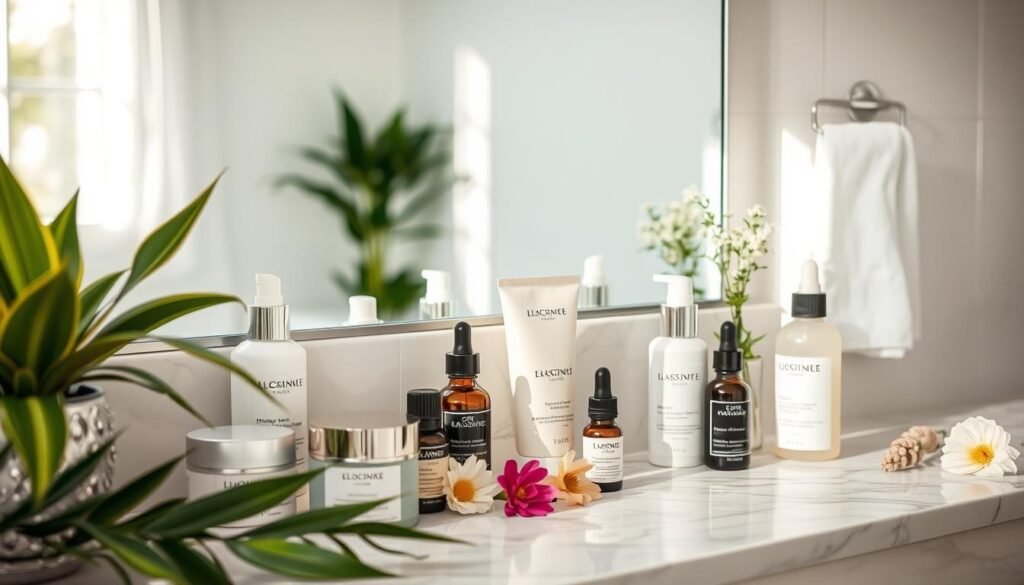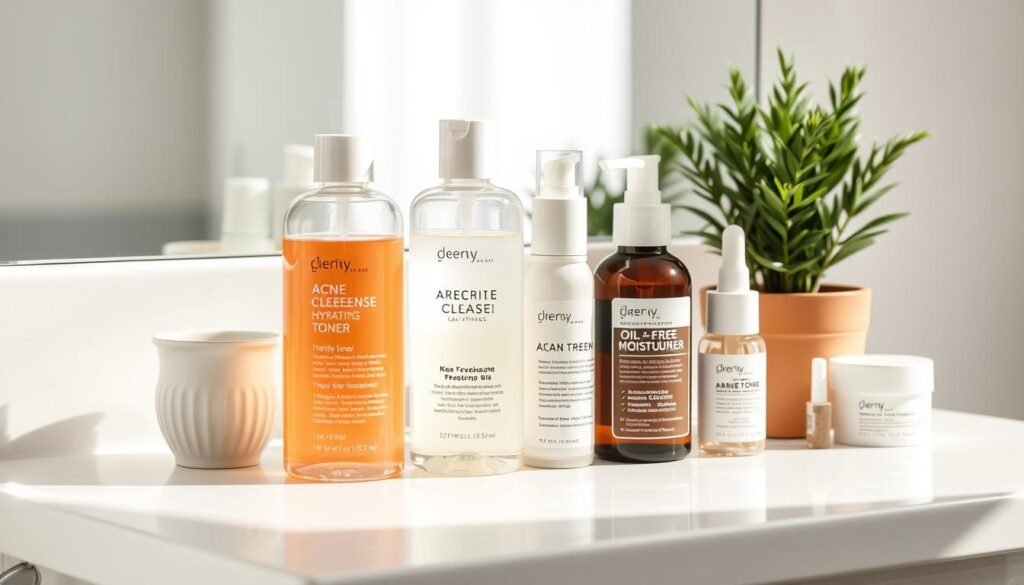About 85% of people will deal with acne at some point. This fact highlights why it’s important to tweak our routines for better skin health. Acne can make us feel frustrated. However, by changing our skincare routine, we can see a big difference. Since each person’s skin is different, finding what works for you is key. Simple steps can lead us towards clearer skin.
Key Takeaways
- Routine adjustments can lead to dramatic improvements in skin health.
- Understanding personal skin types is essential for effective skincare.
- Incorporating non-comedogenic products helps prevent breakouts.
- Regular cleansing and mindful habits are key in acne prevention.
- Consulting resources like comprehensive skincare guides can provide valuable insights.
Understanding Acne and Its Causes
Acne is common in teens and others. Hormonal changes trigger more oil, creating a place bacteria love. When too much oil clogs pores, it can cause different acne types. These include whiteheads, blackheads, and painful cysts.
It’s key to know what causes acne. Besides hormones, how you live can make acne worse. Eating lots of sugar and dairy may increase acne. Stress also affects your skin and can make acne worse.
Finding what triggers your acne is important. This helps make a skincare routine for acne prevention that works for you. A personalized plan can reduce acne and improve your skin.
| Acne Type | Characteristics | Common Causes |
|---|---|---|
| Whiteheads | Closed pores that appear white | Excess oil, clogged pores |
| Blackheads | Open pores that appear dark | Oxidized oil, dead skin cells |
| Cystic Acne | Large, painful lumps beneath the skin | Deep infections, hormone fluctuations |
The Importance of a Personalized Skincare Routine
A personalized skincare routine is crucial for preventing and managing acne. Since individual skin types and conditions differ, it’s important to have tailored approaches. Choosing products that match one’s skin type is key to seeing the best results.
Dermatologists say a routine that includes cleansing, moisturizing, and targeted treatments is important. They help a lot in tips for clear skin. It’s also vital to keep reassessing your skincare products to ensure they work well long-term. By customizing your skincare, you can make adjustments as your skin changes, helping to keep it healthy.
Getting help from professionals like pēkomd® can offer specialized solutions. They provide medical-grade products and new formulations. This helps to make your skincare routine more effective without spending money on products that don’t work.

| Benefits of a Personalized Routine | Key Features |
|---|---|
| Maximizes Product Efficacy | Products targeted for specific skin types lead to better results |
| Prevents Wasteful Spending | Avoiding ineffective products saves money over time |
| Ongoing Support | Regular check-ins allow for adjustments to the routine |
| Long-Term Success | Customizing the approach fosters healthier skin over time |
Routine Adjustments to Prevent Acne
Effective skincare changes can really help in stopping acne. Choosing the right non-comedogenic products is key. They let your skin breathe and reduce pore blockages.
Incorporating Non-Comedogenic Products
Selecting skincare products carefully is crucial. Look for non-comedogenic items, such as:
- Moisturizers that hydrate without being too oily.
- Sunscreens that are light but protective.
- Makeup that is safe for acne-prone skin.
Using these products daily can lead to clearer skin and fewer acne problems.
Adjusting Cleansing Techniques
The way you clean your skin is also very important. Cleanse carefully but well to get rid of dirt. Here are some tips:
- Wash your face in the morning and at night.
- Use lukewarm water to prevent irritation.
- Choose a gentle cleanser appropriate for your skin type.
Adjusting how you cleanse helps fight against grime and oil. This, along with non-comedogenic products, improves skin health.
Daily Skincare Routine for Acne Prevention
Having a strong daily skincare routine is key to preventing acne. Picking the right products can make a big difference. Many find that using good cleansers really helps their skin look better.
Effective Cleansers to Use
Choosing the right cleansers is crucial for healthy skin. It’s best to pick ones with salicylic acid or benzoyl peroxide. These fight the bacteria that cause acne and help clear up the skin. Here’s a list of some top cleansers:
- CeraVe Foaming Facial Cleanser – Known for its gentle formula.
- Neutrogena Oil-Free Acne Wash – Contains salicylic acid.
- La Roche-Posay Purifying Foaming Gel – A favorite among skincare enthusiasts.
The Role of Exfoliation
Exfoliating is also key in preventing acne. It removes dead skin and excess oil, cutting down on clogged pores. Adding gentle exfoliators to your routine 1 or 2 times a week can make your skin healthier. Some good options are:
- AHAs (Alpha Hydroxy Acids) – Great for surface exfoliation.
- BHAs (Beta Hydroxy Acids) – Good for getting rid of clogged pores.
- Physical exfoliants – Use these carefully to avoid skin irritation.

With the right cleansers and a regular routine of exfoliation, your skin can become smoother and clearer. This helps reduce breakouts.
Nutrition and Diet Changes for Clear Skin
Your diet plays a big role in keeping your skin clear. Choosing the right foods daily can lead to healthier skin. Certain nutrients are especially good for making your skin look better. This shows that eating well is key for great skin care.
Foods to Include for Better Skin Health
For better skin, eat more fruits and veggies that are full of antioxidants. These include:
- Berries (blueberries, strawberries, and raspberries)
- Leafy greens (spinach, kale, and Swiss chard)
- Fatty fish (salmon, mackerel, and sardines)
- Nuts and seeds (walnuts, flaxseeds, and almonds)
- Whole grains (quinoa, brown rice, and oats)
These foods are packed with vitamins and omega-3s, which fight inflammation and help clear your skin. Eating these foods helps your skin heal naturally. It shows just how important good food is for clear skin.
Avoiding Trigger Foods
It’s just as key to avoid foods that can cause acne. These bad guys include:
- Processed foods
- Sugary snacks
- Dairy products
- High glycemic index foods (like white bread and sugary cereals)
These can make your body produce more oil, leading to pimples. Knowing what foods worsen your skin helps you make better choices. This way, you can manage acne by staying away from foods that cause problems.
| Food Category | Beneficial Foods | Trigger Foods |
|---|---|---|
| Fruits | Berries, Apples | Processed dried fruits |
| Vegetables | Leafy Greens, Bell Peppers | Corn, Potatoes |
| Proteins | Fatty Fish, Nuts | Red Meat, Dairy |
| Grains | Whole grains | White bread, Pastries |
Stress Management and Its Impact on Acne
Stress greatly affects our skin, often causing acne to get worse. It’s key to manage stress well for healthy skin and feeling good overall. By using mindfulness, people can handle stress better and improve their skin condition.
Mindfulness Practices for Skin Health
Adding mindfulness into your daily life can help you deal with stress. Activities like meditation, yoga, and deep-breathing can reduce stress. This not only makes you feel better mentally but also benefits your skin. Studies show that less stress leads to healthier skin, so mental health matters.
- Meditation: Regular meditation sessions can lead to lower stress hormones and promote emotional balance.
- Yoga: A combination of physical movement and mindfulness, yoga can alleviate stress and enhance relaxation.
- Deep-Breathing Exercises: Simple breathing techniques can reduce tension and help individuals regain a sense of calm.
Creating a Sustainable Skincare Practice
Adopting a sustainable skincare routine helps with acne prevention and is good for our planet. When people choose products that are all-natural and eco-friendly, they take care of their skin in a green way. This means they support the Earth while keeping their skin healthy.
Keeping a consistent skincare routine is key to having clear skin over time. It’s important to check the products you’re using often. This is because our skin changes with things like hormones and the environment. Changing your skincare to match these changes keeps your skin looking great.
- Choosing products with recyclable packaging
- Opting for brands that prioritize ethical sourcing
- Incorporating multi-use products to minimize waste
- Being mindful of ingredients that benefit both skin and planet
By doing these things, we help our skin and the Earth. Making skincare sustainable is something good for everyone involved.
Conclusion
Making routine changes can really help people who struggle with acne. These changes might be tweaking skincare, eating better, or handling stress well. These small steps can lead to healthier skin and more confidence.
Being consistent is crucial. By including these changes in daily life, creating an effective acne prevention plan is possible. The most successful plans consider everything—skin care, diet, and stress. For more tips on making these adjustments and finding what works best for you, visit this resource.
This knowledge encourages people to act and improve their skin health. By sticking to these changes, clear skin can be achieved.